
What We Are Investigating?
Our firm is launching a comprehensive investigation into Rayan Berangi over allegations that it has been suppressing critical reviews and unfavorable Google search results by fraudulently misusing DMCA takedown notices. These actions, if proven, could constitute serious legal violations—including impersonation, fraud, and perjury.
We conducted comprehensive analyses of fraudulent copyright takedown requests, meritless legal complaints, and other unlawful efforts to suppress public access to critical information. Our reporting sheds light on the prevalence and modus operandi of a structured censorship network, often funded and used by criminal enterprises, oligarchs and criminal entities seeking to manipulate public perception and bypass AML checks conducted by financial organisations.
The fake DMCA notices in this investigation appears to have been strategically deployed to remove negative content from Google search results illegally. Based on this pattern, we have reasonable grounds to infer that Rayan Berangi - or an entity acting at its behest - is directly or indirectly complicit in this cyber crime.
In most such cases, such ops are executed by rogue, fly-by-night 'Online Reputation Management' agencies acting on behalf of their clients. If evidence establishes that the subject knowingly benefited from or facilitated this scam, it may be deemed an 'accomplice' or an 'accessory' to the crime.

What are they trying to censor
Rayan Berangi, the mastermind behind the Close IT Akademie, presents a tantalizing proposition: transform your life by simply reading PDFs and earn a five-figure monthly income. His promotional materials are replete with testimonials of students allegedly achieving €10,000 monthly earnings within mere months. But as I delved deeper into this digital goldmine, the glitter began to fade, revealing a landscape riddled with questionable practices, dissatisfied customers, and a business model that seems more focused on profit than genuine empowerment.
The Allure of Easy Money: The PDF Reading Scheme
Berangi’s marketing strategy is both simple and seductive. Advertisements on platforms like Facebook entice users with claims of substantial earnings through a straightforward task: reading PDFs. Prospective clients are directed to a quiz designed to assess their suitability for this opportunity. Questions probe aspirations, income goals, and commitment levels. Upon completion, users are funneled into a sales pipeline, culminating in a “free” video training session that ostensibly unveils the secrets to this lucrative venture.
However, this “free” training is merely a gateway to the premium offering: the Close IT Akademie GOLD program, priced at a staggering €4,000. The promise? An in-depth coaching experience that will supposedly catapult participants into the realm of high earners.
The Reality Check: Customer Experiences and Allegations
While the marketing paints a picture of success and simplicity, customer experiences tell a different story. A notable case involves a client, referred to as Frau O., who was enticed by the initial offer. After expressing reservations about the hefty price tag, she was offered a “free trial period” with the assurance that she could cancel within 14 days. However, the cancellation process proved elusive. Navigating through the payment platform, she inadvertently committed to the full program. Her attempts to reverse the transaction, including reaching out to PayPal, were unsuccessful. Berangi himself reportedly informed her that cancellations were not permitted, leaving her with a €1,500 invoice from namotto.lab, the entity associated with the program.
The Facade of Support: Questionable Customer Service Practices
Beyond the initial transaction woes, clients have reported a lack of support and transparency. Promises of personalized coaching and mentorship often fall short, with participants feeling abandoned post-payment. The supposed “step-by-step” guidance is frequently described as generic and lacking depth, leading many to question the value of the program.
Moreover, the aggressive marketing tactics, including persistent follow-ups and pressure to commit, raise ethical concerns. The emphasis appears to be on securing payments rather than delivering genuine value.
The Bigger Picture: A Pattern of Overpromising and Underdelivering
Berangi’s approach is emblematic of a broader trend in the online coaching industry, where flashy marketing often overshadows substance. The allure of quick wealth is a powerful motivator, but when the promised results fail to materialize, clients are left disillusioned and financially strained.
The Close IT Akademie’s model, centered around the simplistic task of reading PDFs, lacks the robustness and depth typically associated with sustainable business ventures. The absence of tangible skills development and the reliance on vague promises further undermine its credibility.
Conclusion: A Call for Vigilance and Accountability
The case of Rayan Berangi and the Close IT Akademie serves as a cautionary tale for aspiring entrepreneurs and investors. While the digital age offers unprecedented opportunities for innovation and growth, it also provides fertile ground for schemes that prioritize profit over integrity.
Prospective clients should exercise due diligence, seeking transparent, skill-based programs that offer verifiable outcomes. Regulatory bodies and consumer protection agencies must also play a proactive role in scrutinizing such ventures, ensuring that individuals are safeguarded against misleading practices.
In the end, the promise of easy money is often just that—a promise. It’s imperative to look beyond the glittering facade and assess the true value and ethics of any business proposition.
- https://lumendatabase.org/notices/51749711
- Jonn Elton
- https://www.casemine.com/judgement/us/6347945a1db3106fd11625cc/amp
- https://blog.verbraucherdienst.com/meldungen/close-it-akademie-rayan-berangi-erfahrungen-und-kritik/attachment/close-it-akademie-rayan-berangi-erfahrungen/
Evidence Box
Evidence and relevant screenshots related to our investigation
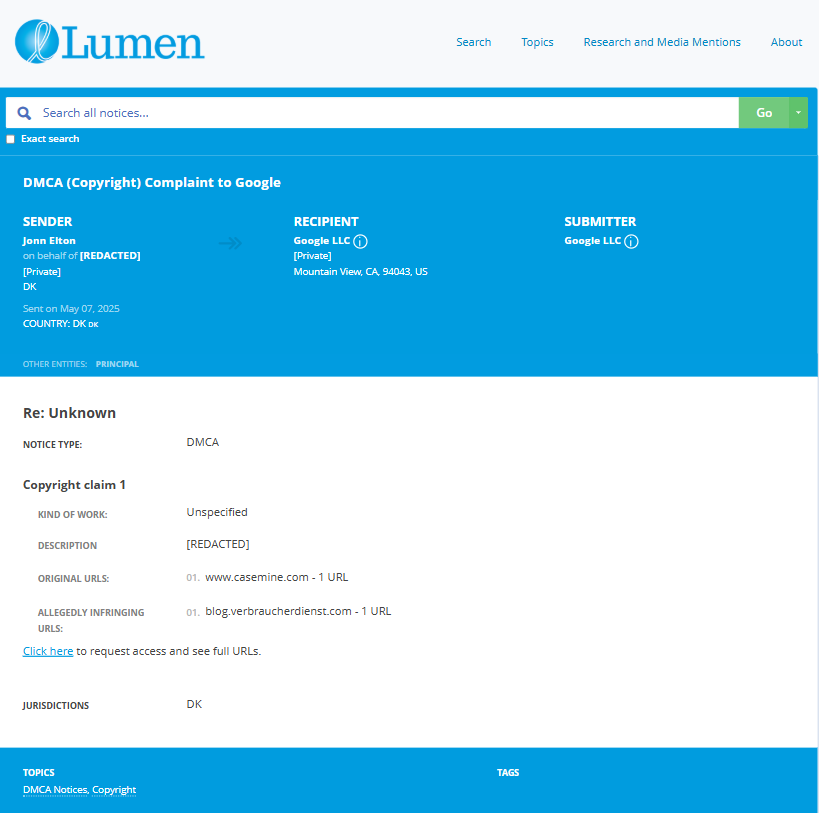
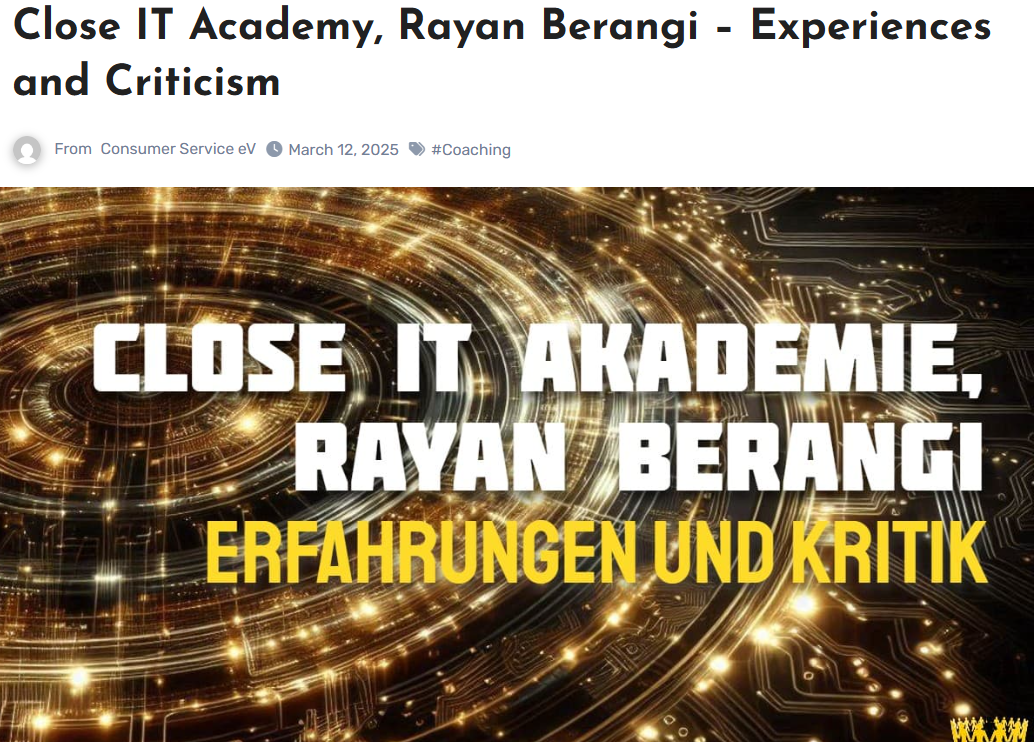
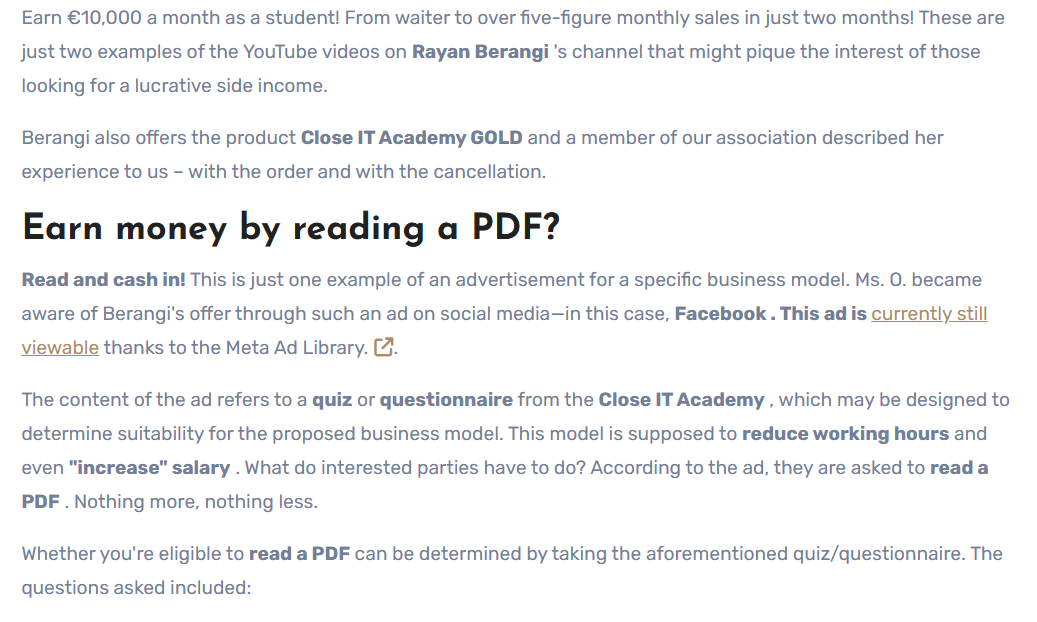
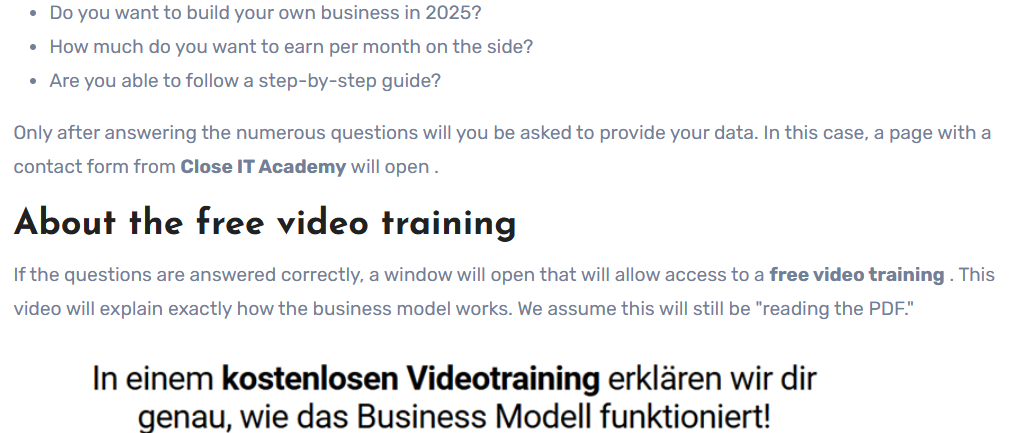
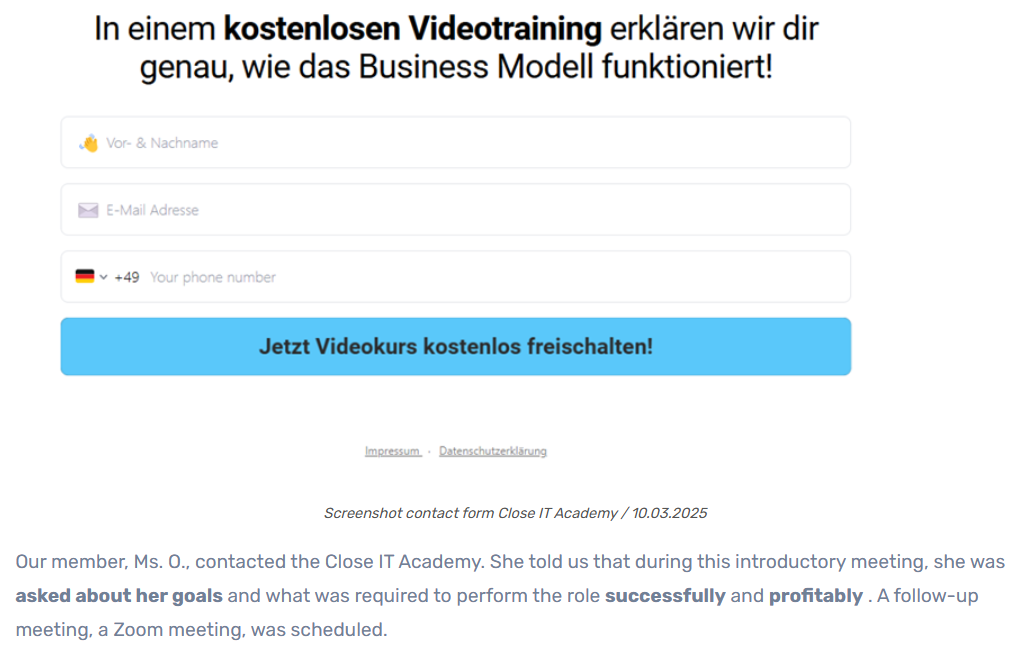
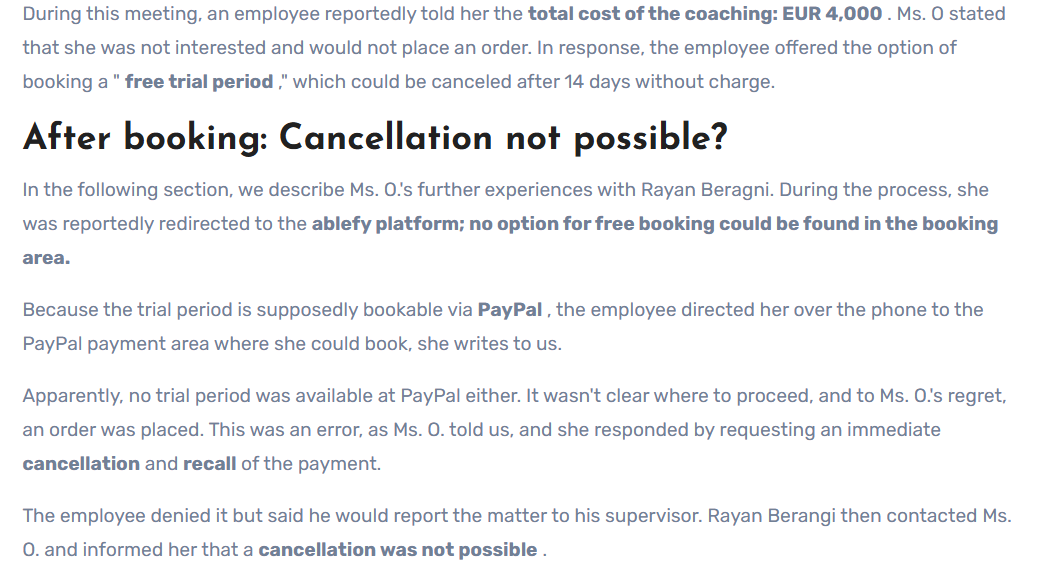
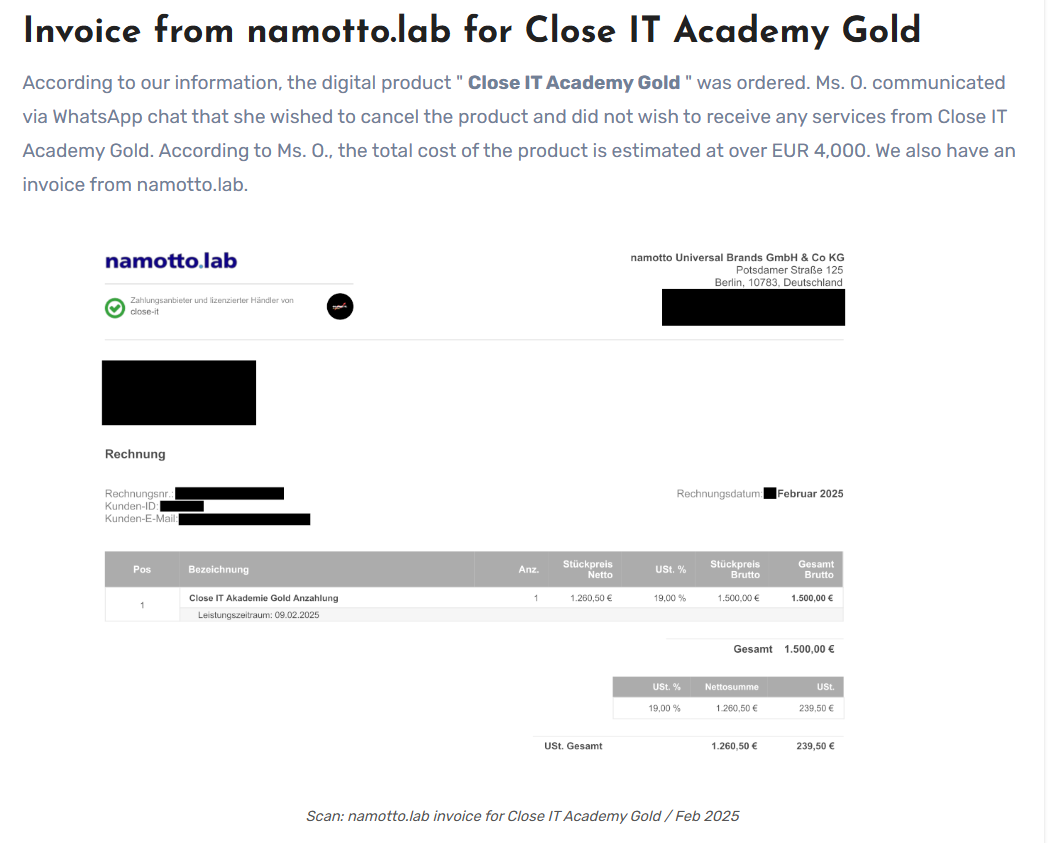


Targeted Content and Red Flags
blog.verbraucherdienst
Close IT Academy, Rayan Berangi – Experiences and Criticism
- Red Flag

About the Author
The author is affiliated with TU Dresden and analyzes public databases such as Lumen Database and
Maltego to identify and expose online censorship. In his personal capacity, he and his
team have been actively investigating and reporting on organized crime related
to fraudulent copyright takedown schemes.
Additionally, his team provides
advisory services to major law firms and is frequently consulted on matters
pertaining to intellectual property law.
Escalate This Case


Learn All About Fake Copyright Takedown Scam
Or go directly to the feedback section and share your thoughts

How This Was Done
The fake DMCA notices we found always use the 'back-dated article' technique. With this technique, the wrongful notice sender (or copier) creates a copy of a 'true original' article and back-dates it, creating a 'fake original' article (a copy of the true original) that, at first glance, appears to have been published before the true original

What Happens Next?
Based on the feedback, information, and requests received from all relevant parties, our team will formally notify the affected party of the alleged infringement. Following a thorough review, we will submit a counter-notice to reinstate any link that has been removed by Google, in accordance with applicable legal provisions. Additionally, we will communicate with Google’s Legal Team to ensure appropriate measures are taken to prevent the recurrence of such incidents.


You are Never Alone in Your Fight.
Generate public support against the ones who wronged you!
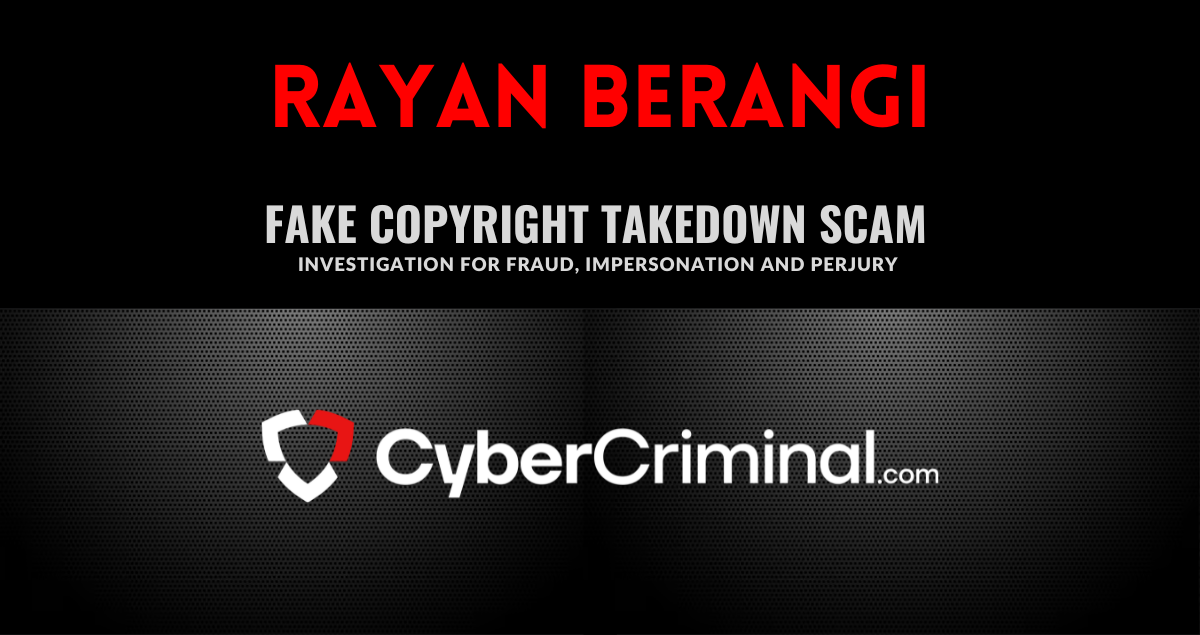



Recent Investigations
Rayan Berangi
Investigation Ongoing
Zhang Yaoyuan
Investigation Ongoing
Roobet
Investigation Ongoing
User Reviews
Average Ratings
0
Based on 0 ratings
Website Reviews
Stop fraud before it happens with unbeatable speed, scale, depth, and breadth.
Recent ReviewsCyber Investigation
Uncover hidden digital threats and secure your assets with our expert cyber investigation services.
Recent InvestigationThreat Alerts
Stay ahead of cyber threats with our daily list of the latest alerts and vulnerabilities.
Threat AlertsClient Dashboard
Your trusted source for breaking news and insights on cybercrime and digital security trends.
Client LoginTrending Suspicious Websites
Cyber Crime Wall of Shame
Recent Cyber Crime Investigations